Bundeswehr: the search for answers to the challenges of the era
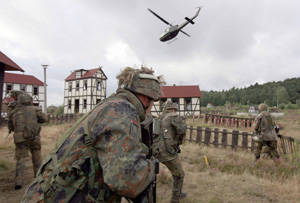 For more than a thousand years stories Germanic state his most important institution was the army. Its development reflected, as in a mirror, the external and internal policies, goals and attitudes of the ruling circles. The ups and downs of the country during its complex and controversial history, especially in the twentieth century, invariably reflected on the armed forces. And now comes the next stage of transformation.
For more than a thousand years stories Germanic state his most important institution was the army. Its development reflected, as in a mirror, the external and internal policies, goals and attitudes of the ruling circles. The ups and downs of the country during its complex and controversial history, especially in the twentieth century, invariably reflected on the armed forces. And now comes the next stage of transformation. The Bundeswehr, the armed forces of the Federal Republic of Germany, one of the most economically developed countries in Europe and the world, takes its beginning in the 1954 year, when the occupation regime was canceled in West Germany. Having become sovereign, the country joined NATO, it was allowed to re-establish the armed forces, which received their current name in 1956. Since then, the German armed forces ranked second in the North Atlantic Alliance in numbers and firepower after the United States. Today, their total number is 400 thousand people.
Today, the armed forces of united Germany are equipped with modern weapons and military equipment and are the most combat-ready among the countries of the Old World.
They are formed according to the functional principle: rapid reaction forces; stabilization forces; special operations forces; airmobile forces. The basis of the reform of the Bundeswehr - the requirements of rapid adaptation to new threats to national security. At the same time, defense planning and current activities of the German Armed Forces are components of the European Union and NATO defense policy.
MONEY UNDER EFFICIENCY
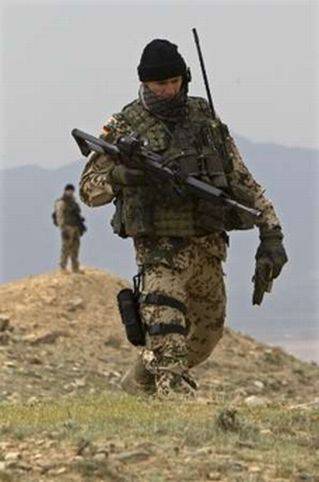 German Chancellor Angela Merkel has repeatedly stated that at the head of the corner should be an effective army, providing security in modern conditions, and appropriate amounts will be allocated for such an army. Against this background, in April 2010 in the country spoke aloud about the next reform of the Bundeswehr. It was at this time that the federal authorities began to search for financial reserves in order to limit the growth of large public debt. The Ministry of Finance calculated: in the next four years, the Bundeswehr can save 8,3 billion euros. This figure was included in the long-term budget plans.
German Chancellor Angela Merkel has repeatedly stated that at the head of the corner should be an effective army, providing security in modern conditions, and appropriate amounts will be allocated for such an army. Against this background, in April 2010 in the country spoke aloud about the next reform of the Bundeswehr. It was at this time that the federal authorities began to search for financial reserves in order to limit the growth of large public debt. The Ministry of Finance calculated: in the next four years, the Bundeswehr can save 8,3 billion euros. This figure was included in the long-term budget plans. Then, in April, Karl-Theodor zu Guttenberg, the Minister of Defense of the Federal Republic of Germany, created a special commission that would be engaged in reforming the Bundeswehr and increasing its effectiveness. The commission of six people was headed by the head of the Federal Labor Office, Frank-Juergen Weise. In addition to him, the commission included five more people. Among them - the coordinator of German-American relations in the government of Germany Hans-Ulrich Klose and General Karl-Heinz Later.
However, specific proposals for reforming the Bundeswehr, Zu Guttenberg, after informing Angela Merkel, presented to the experts of the ruling parties - the conservative CDU / CSU bloc and the liberal FDP 23 of August. Please note: this was done on the eve of the anniversary of the beginning and end of the Second World War, which was unleashed and led by the Hitler Reich and his Far Eastern ally, militarist Japan.
It is well known to what the alienation of the German army from society led in its time. Modern Germany, being a democratic state, officially renounced its Nazi past and the policy of aggression and revenge. Was taken into account the sad experience of the Weimar Republic, when the Reichswehr actually became a state in the state. Therefore, the post of the Minister of Defense of Germany since that time has been occupied not by a military person, but by a civilian. It must be admitted that in more than half a century of its existence, the Bundeswehr has changed, corresponding to the democratic appearance and the socio-political essence of the country; there are no ideas of Hitler, revenge and modern right-wing ideologues in the barracks.
Recall that compulsory military service was introduced in Germany 1 April 1957. It was emphasized that the soldiers are the same citizens, but in military uniform. The call was entrusted with the most important function of ensuring communication between society and the armed forces.
Under Chancellor Konrad Adenauer, the Federal Republic of Germany adopted a new Constitution, which enshrined a ban on the use of the German army outside the country. And during the first 40 years, this rule was observed. But in 1995, it was broken. The German Air Force, as part of the NATO forces, took part in an operation against the Bosnian Serbs, making 59 sorties. Then - the operation in Kosovo in 1999 year. Two years later - participation in the Afghan campaign, plus peacekeeping operations in the Middle East and Africa.
Today more than 8 thousand soldiers of the Federal Republic of Germany participate in combat and peacekeeping operations outside the country. The largest group of the Bundeswehr is in Afghanistan - 4520 people. Balkan, in Kosovo, has 2450 people. The third, outnumbered 420, operates in the Horn of Africa against Somali pirates. The rest of the operations - in the Mediterranean, Lebanon, Georgia, Sudan and Chad - involved 711 soldiers of the Bundeswehr.
In recent years, German units participate in exercises and directly at the borders of Russia. Specifically, we are talking about the Baltic States. In the military game “Erna”, the actions of Hitler’s military intelligence and counterintelligence - Abwehr - in Estonia against the Red Army in 1941 were recreated there. In total, more than 120 thousand German soldiers took part in foreign military operations.
One way or another, today it is clear that the Bundeswehr is on the threshold of the largest reform in its history. Moreover, if the Ministry of Defense succeeds in accomplishing this, it will lead to cardinal changes both in Germany’s domestic and foreign policy. Not surprisingly, the reform project has sparked controversy. Even in government circles there is no unity on this issue.
The planned reorganization and rearmament of the Bundeswehr is thought of on the basis of the already existing fundamental documents. The cornerstones of the reform of the German armed forces are the “Main Directions of the Federal Policy of Germany in the Field of Defense”, the “Concept for the Reform of the Bundeswehr” and the “White Book of Germany on Security Issues and the Perspective of the Bundeswehr”. In particular, the White Paper notes: the most urgent tasks of the German armed forces are missions to resolve international conflicts - they most affected their structure and capabilities. In accordance with the Reform Concept, the main priorities of the Bundeswehr are the defense of forces, control, reconnaissance, missile defense, high-precision weapon and strategic transportation.
Of course, funds are needed for defense reforms. As reported, in 2010, Germany’s defense spending will be 5,43 billion euros, by 2013 it is planned to increase them to 5,56 billion euros. 17 June 2009, the Bundestag (German parliament) approved the decision on financing a long-term arms procurement program. We are talking about the 31 fighter EF-2000 "Typhoon" (2,8 billion euros), 405 armored vehicles "Puma" (3,1 billion euros), 5 unmanned underwater vehicles for demining "Si Fuchs" (37,9 million euros) and other types of military technology new generation.
Earlier, the head of the military department has repeatedly criticized the large-scale increase in costs and the backlog in the implementation of various projects for the Bundeswehr. At the same time, an analysis of the effectiveness of the actions of the Bundeswehr military personnel in the composition of international forces showed that "structural changes are necessary". In this regard, the meaning of the critical statements of Zu Guttenberg is reduced to the need to increase the "economic potential" of the Bundeswehr, bringing it into line with contemporary tasks. Among the possible measures are also called verification of weapons projects, the optimal use of human and financial resources.
FOURTH MODEL OF FIVE
By the end of 2010, the aforementioned commission of Frank-Jürgen Weise will have to make proposals for improving the efficiency of the structure of the German armed forces. At the same time, she will be able to rely on the results of a study of shortcomings in the work of the Bundeswehr, conducted in the German Ministry of Defense and intended for internal use.
According to press reports, the Defense Department has developed five reform models. The minister himself prefers the fourth. According to this model, the largest reductions are to be made in the ground forces. They are supposed to be cut by almost half. If so, there will be 54 infantry, one artillery battalion, one airborne regiment and three tank battalion with 44 combat vehicles "Leopard-2" in each.
Today in the Bundeswehr there are about a quarter of a million soldiers and officers, of whom only 7,5 thousand have undergone special training to perform tasks outside the country. Mr. Zu Guttenberg, the total strength of the armed forces is seen in the range from 165 to 170 thousand people. Of this amount, of them, 10 thousand troops could take part in foreign missions.
But if the planned reduction in the number of people in the country and in the army seems to have already come to terms, the disputes over the principle of its recruitment are still ongoing. Indeed, universal conscription still exists in the FRG, although most experts consider it to be a relic of the past. That is, the time when, in the epoch of the military confrontation of the East and West that had fallen into the past, the Bundeswehr was assigned the task of defending the territory of the state. And for this, in those conditions, numerous armed forces and, accordingly, universal conscription were required.
However, the draft system today remains only in five NATO member countries from 28: in addition to Germany, in Greece, Norway, Turkey and Estonia, and each country has its own reasons for maintaining such a system. In Germany, many believe that in modern conditions there is no need for mass conscription for military service. Nevertheless, Chancellor Angela Merkel is confident that it is dangerous to completely cancel the call in Germany. Like, it is still unknown how the situation will develop in the future. Mrs. Merkel took care of her summer vacation: what if somebody threatened Germany again. In any case, as she said at a press conference.
Does not advocate the abolition of conscription and the removal of the relevant article in the Constitution and the Minister of Defense zu Guttenberg. At the same time, he proposes to introduce a moratorium on the action of universal military service, making it voluntary for those who consider military service to be their civic duty. And those, according to the minister, per year will reach 7,5 thousand. The temporary nature of the suspension of compulsory implies that although in practice it will actually be canceled, the possibility of its renewal will remain enshrined in the Constitution. As Zu Guttenberg himself noted, no one knows what the world will look like in 30 years, and Germany should have the opportunity, if necessary, to increase the number of the Bundeswehr at the expense of draftees.
And what is offered in return for the call? According to the German media, voluntary service will be introduced for a period from 12 to 23 months. Every year, 7500 volunteers will be able to enter the service - both men and women. It is believed that the voluntary service in the army will be attractive to the Germans, because for the most part they are law-abiding and conscious. But what about the reduction in funding? Other attractive moments are foreseen: volunteers can voluntarily get a driver's license in its ranks, purchase tickets to theaters and concerts at a discount, etc. And most importantly, to be eligible for benefits when you enroll in one of the army universities. The service life is supposed to be biennial. But if, nevertheless, a volunteer in the first six months comes to the conclusion that the army’s path is not for him, he still has the right to resign early.
At the same time, there are fears that the reduction in the number of the Bundeswehr will lead to the impossibility of maintaining in the previous volumes the participation in foreign peacekeeping missions. And this may cause a decrease in the country's political influence in the world. According to former Defense Minister Peter Struck and the current Franz-Josef Jung, without military service, the Bundeswehr will turn into a “army of mercenaries” - like the French Foreign Legion.
DIFFERENT OPINIONS
However, the initiatives of Zu Guttenberg were far from being enthusiastic for everyone in Germany. Moreover, the local press describes the position of many German conservatives about the abolition of universal conscription as a taboo. The Prime Minister of Lower Saxony, David Mac-Alister, recalled that since 1955, the Christian Democratic Union (CDU) has remained a conscription service. Another provincial leader, the head of the government of Hesse, Roland Koch, believes that even with a financial deficit, one cannot sacrifice the integration of the army into society. And this was achieved precisely due to the draft system.
Chancellor Angela Merkel promised to take into account these opinions (or, if you will, doubts). It was decided to adopt the decision on the moratorium on universal military service only after a broad internal party discussion, the results of which will be enshrined in resolutions of the CDU and CSU congresses scheduled for mid-autumn.
The question of the use of the Bundeswehr in the country split the Constitutional Court of Germany. Some of its members believe that, without amending the Basic Law, the use of military equipment inside the country should remain banned. At the same time, the other part holds the exact opposite position. If agreement cannot be reached, this issue will be discussed at the Plenum of the Constitutional Court. At least the following fact speaks of the importance of this problem: in the entire history of the Federal Republic of Germany, the Plenum of the Constitutional Court has met only four times. Yes, and there understood especially private, procedural and legal aspects. And now for the first time a decision will be made on the most important constitutional issue.
It is noteworthy that earlier the first senate of the Constitutional Court ruled that, with the exception of cases of defense and defense, the Bundeswehr could not use military equipment inside the country, including airborne weapons of Air Force planes. According to the decree, only auxiliary police equipment may be used. However, the second senate demands that this restriction be lifted, on the assumption that, in accordance with the Constitution, the Bundeswehr in particularly difficult circumstances can use all its military potential inside the country, guided by the principle of proportionality and conformity.
At the same time, recognizing the need for reform and cost savings, many conservatives are in favor of a compromise: reduce the number of the Bundeswehr to 205 thousand people, of whom 25 thousand should serve as an appeal. There are other proposals: to establish the number of military personnel and contract servicemen in 150 thousand people, and with it let 25 thousand conscripts and 25 thousand volunteers serve.
As for the Social Democrats, they fear that the abolition of conscription service will result in the abolition of alternative service. But there are about 90 of thousands of young people who are employed mainly in the social sector - in hospitals, nursing homes, etc. Christina Schroeder, Minister for Family, Elderly and Young People, said that at least a third of this number should be kept - about 35 thousands. But many alternatives do not hide: if it were not an obligatory military draft, they would never have gone to alternative service.
Doubts about the reformation also overwhelm the military. So, the inspector general of the Bundeswehr (the highest military rank in the German army) Volker Vicker is not sure that there will be 7500 volunteers a year. As the general believes, the voluntary service system should be tested in test mode for two or three years. There is a danger that the Bundeswehr will not be able to offer young people the financial and social conditions that attract civilian employers. It should also not be forgotten that the reduction in the number of Bundeswehr will lead to the closure of many barracks, the collapse of infrastructure, and as a result, thousands of civilians may lose their jobs.
One way or another, it is not clear yet which model of reforming the Bundeswehr will eventually be adopted. But in any case, he will be different. It remains to wait for the party congresses of the CDU and the CSU, when the fall will count the "chickens" for the army.
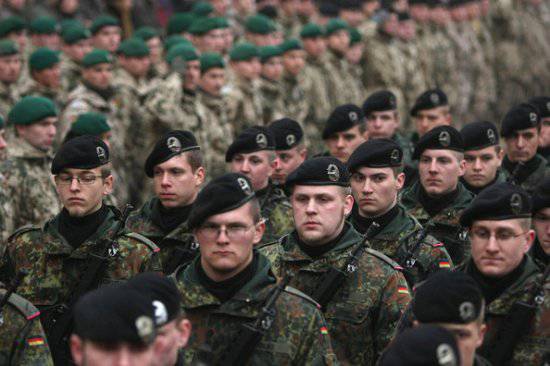
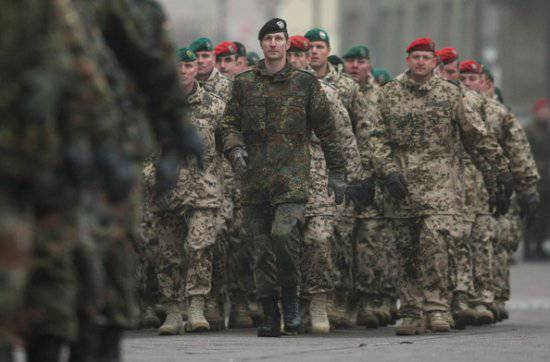
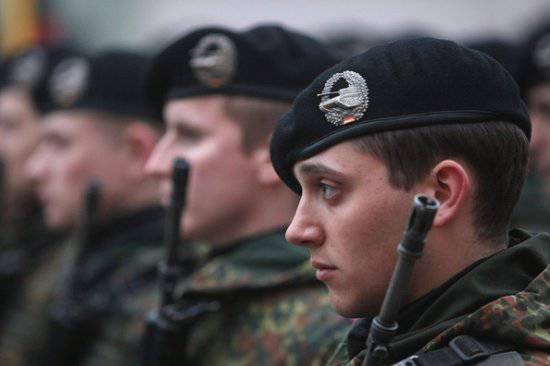
Information